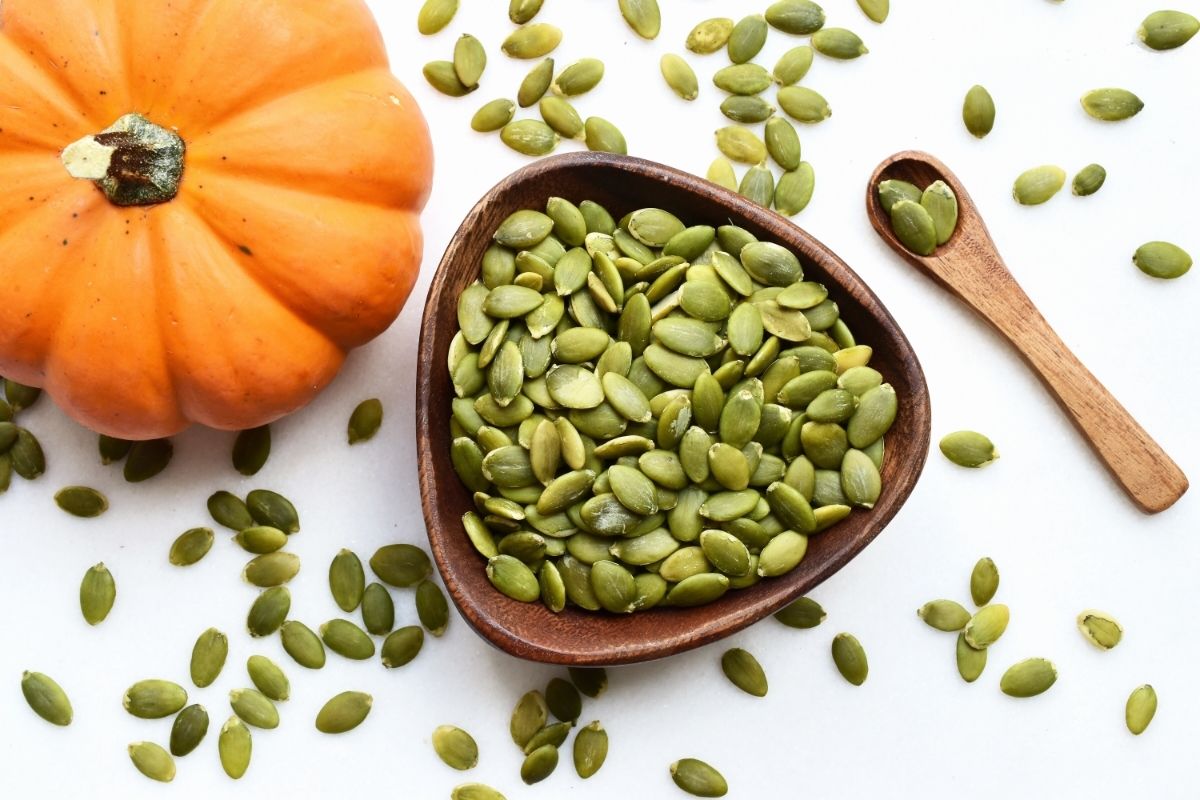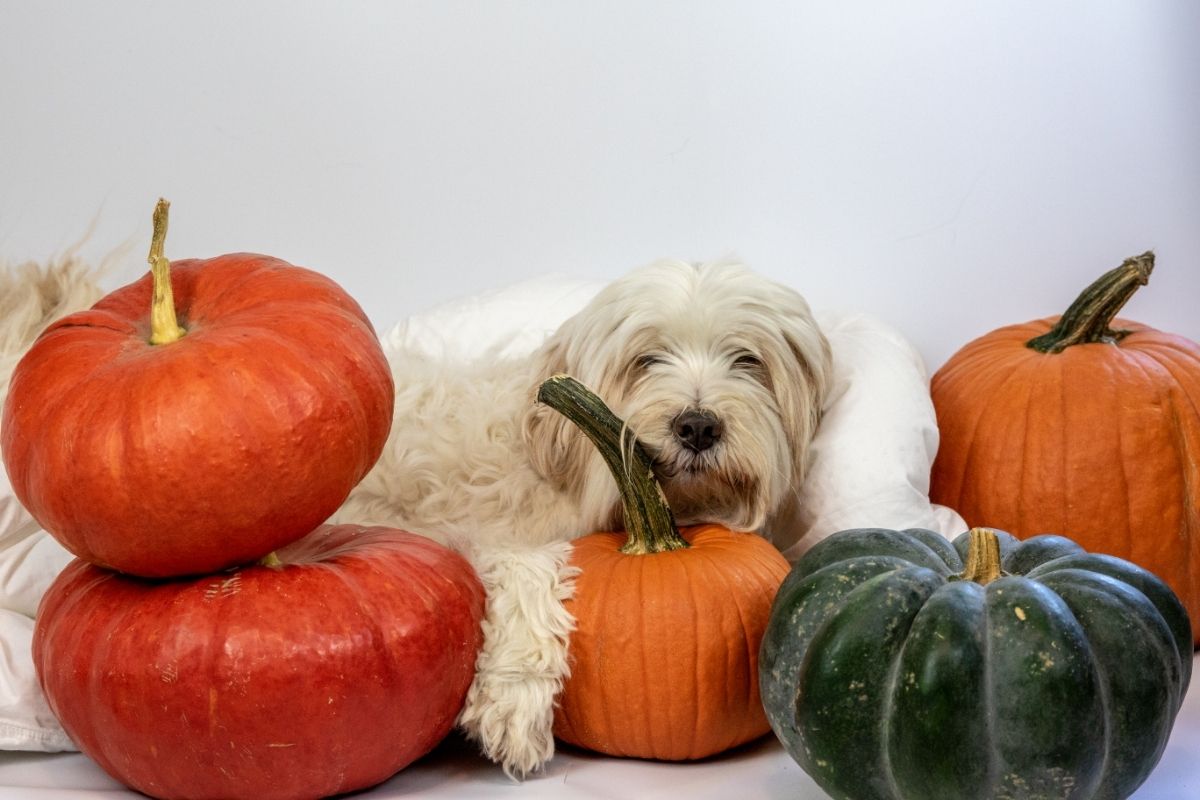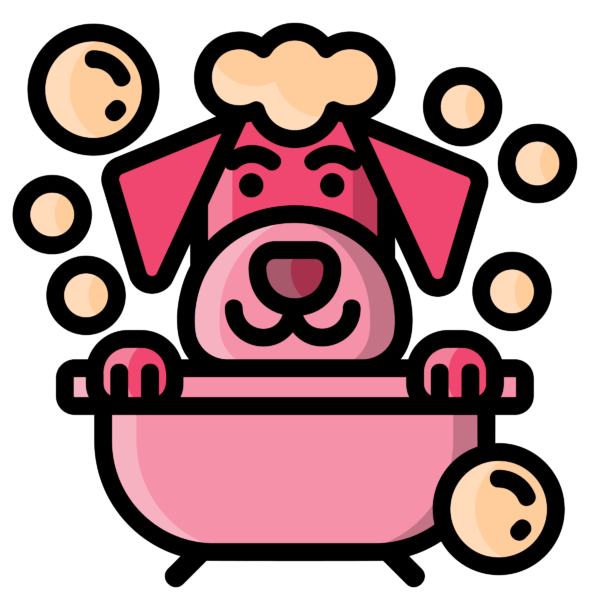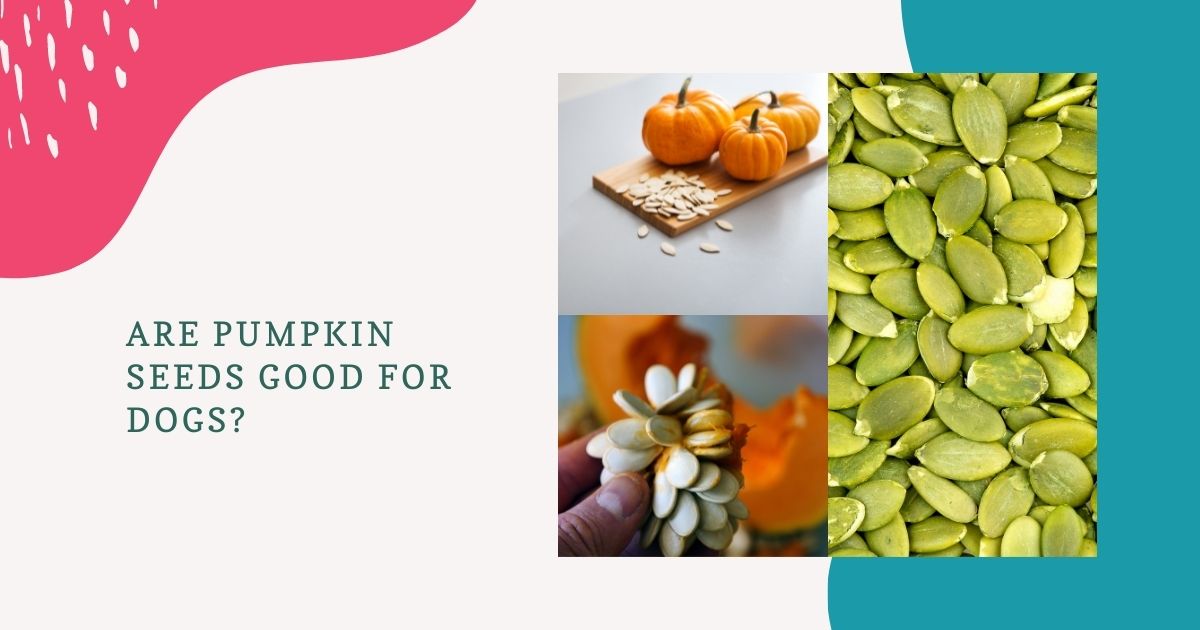Dogs and Pumpkin Seeds
Are pumpkin seeds good for dogs? Pumpkins and pumpkin seeds are nutritious foods for people, and they provide several health benefits for dogs. Pumpkin seeds are healthy for dogs to eat. It’s always good to talk to your vet about what proportion of pumpkin is safe to add to your dog’s diet.
When it comes to pumpkin seed, you should consult your veterinarian about the appropriate amount. This usually depends on your dog’s weight.

Are Pumpkin Seeds Good for Dogs?
Can dogs eat pumpkin seeds? Yes, you can give your dog pumpkin seeds, with one caveat: it is highly advisable to clean, peel, roast, and grind them first. In addition, you should not feed raw pumpkin seeds to your dog since they can quickly deteriorate and grow rancid.
Roasted and powdered pumpkin seeds are a simple addition to your dog’s meal with numerous health advantages. Although feeding dogs pumpkin seeds necessitates some preparation on your part, the benefits of doing so are numerous. You can also find pumpkin seeds in various homemade dog food recipes.
Do you need some pumpkin dog treat ideas? Take a look at the following recipes online:
- Healthy Pumpkin Cookie Dog Treat Recipe
- Pumpkin Dog Biscuits for Sensitive Stomachs
- Pumpkin Peanut Butter Homemade Dog Treats
- Nutrition of pumpkin seeds
Let’s look at the nutrients of pumpkin seeds and some of their health advantages. An ounce of peeled pumpkin seeds provides the following nutrients:
- Calories: 126
- Fiber: 1.7 grams.
- Carbs: 5 grams.
- Protein: 7 grams.
- Fat: 13 grams
- Vitamin K
- Phosphorous
- Manganese
- Magnesium
- Iron
- Zinc
- Copper
Because pumpkin seeds are high in fiber, they can aid digestion in dogs, resulting in weight loss in overweight dogs and improving their overall health. So if you prepare them correctly, pumpkin seeds can be healthy for your dogs.
They also have one of the highest magnesium content of any diet, which can aid in the maintenance of strong bones, the regulation of blood sugar and pressure, and the reduction of the risk of heart disease in dogs. Pumpkin seeds are also suitable for their ability to aid dogs with various ailments, infections, and worms.
7 Benefits of Pumpkin Seeds for Dogs
The following are seven health benefits of feeding pumpkin seeds to dogs:
- Pumpkin seeds include antioxidants and fatty acids that help a dog’s urinary wellness. These seeds are high in antioxidants and fatty acids, vital for urinary health and preventing urinary tract infections. You can help overactive bladder in senior dogs with pumpkin seed oil. Additionally, the seeds can aid in preventing and removing kidney stones.
- Pumpkin seeds are a natural way to fight parasites in dogs. Pumpkin seeds contain cucurbitacin, an amino acid that you can use to rid a dog’s body of parasites and worms. Cucurbitacin acts as a deworming agent, paralyzing and eliminating these intestinal parasites. In addition, it’s outstanding in getting rid of roundworms and tapeworms.
- Dogs benefit from the anti-inflammatory properties of pumpkin seeds. Pumpkin seeds, which are high in Omega-3 fatty acids, can help reduce inflammation, making them an essential ingredient in the fight against arthritis and hip or elbow dysplasia in older dogs.
- Dogs with mild prostatic hyperplasia may benefit from pumpkin seeds. Many male dogs over nine have benign prostatic hyperplasia or prostate gland enlargement. Pumpkin seeds can assist in managing this illness and keep it from giving your dog any significant discomfort.
- Pumpkin seeds have lipids that feed the dog’s body with “healthy” fats. Lipids are “healthy” fats that the body requires to function. Pumpkin seeds are high in monounsaturated and polyunsaturated fats, suitable for your dog. These lipids are in charge of decreasing bad cholesterol and raising good cholesterol levels.
- Vitamins E and K may help a dog’s heart and circulatory system. Vitamin E, a fat-soluble vitamin, protects cells from free radicals and lowers blood pressure. Vitamin K helps the skin repair after an injury and contributes to average bone growth and maintenance. Vitamin K, in addition to creating blood clots after tissue damage, also stops bleeding by aggregating blood cells.
- Pumpkin seeds are high in minerals essential for a dog’s health. Pumpkin seeds contain large amounts of the following essential minerals:
- Potassium is good for muscles.
- Zinc is vital for immune system function, hormone balance, and brain activity.
- Red blood cell activity requires iron, phosphate, and magnesium.
- Calcium is necessary to grow strong, healthy bones and teeth and prevent cancer.
Is Pumpkin Bad for Dogs?
In some cases, are pumpkin seeds harmful to dogs? No, it’s not true. Giving pumpkin seeds to dogs has no adverse consequences. However, there are a few things to remember and avoid while feeding them to your dog.
- You should avoid salt at all costs. Dogs should only consume plain pumpkin seeds, so don’t season them with salt. Adding salt to a dog’s diet can pose health dangers, particularly regarding sodium levels in the body. Keep the seeds as simple as possible.
- You should roast them. Before feeding pumpkin seeds to your dog, make sure you roast them. Fresh seeds spoil rapidly; roasting them for about a month enhances their shelf life (they also taste better when you roast them).
- Keep your items in a safe place. For example, you must keep pumpkin seeds in sealed packets since they are highly hazardous after being spoiled. You can store these seeds for up to six months in sealed packs.

Do Dogs Like Pumpkin?
Can dogs have pumpkin? Plain pumpkin is a favorite of most dogs, and they will happily eat it on its own or incorporate it into their usual meal. Many dogs prefer pumpkin seeds as a snack, but if your dog is hesitant to eat them alone, they can be pulverized and put into food.
Veterinarians frequently prescribe pumpkins to aid dogs with loose stools. Adding a tablespoon of canned pumpkin (not pie filling) to your dog’s diet might help firm up diarrhea and make excursions outside easier for both you and your dog. In addition, pumpkins are high in fiber, which might help with digestion.
Can Puppies Eat Pumpkin?
Yes, pumpkin can be a healthy part of a dog’s balanced diet in most situations. Pumpkin has a wide range of health benefits for your dog, thanks to its naturally occurring fiber and high vitamin content.
Pumpkin is a dog’s superfood. It’s high in fiber and vital micronutrients, making it a healthy snack. In addition to being a natural stomach soother, pumpkin also aids in the removal of excess water from a dog’s digestive tract.
Will pumpkin cause my puppy to vomit? Unfortunately, yes. You can use plain canned pumpkin (not pie filling) to increase fiber in the diet, promote healthy stool, and maintain a healthy gut, but too much might induce loose stool, especially if your dog has a pumpkin allergy.
Can Dogs Eat Squash Seeds?
Squash is a delightful vegetable high in vitamins A, C, and B6 and minerals such as folate, potassium, magnesium, fiber, and phosphorus. Squash is beneficial for people because of all the vitamins and nutrients, but is it good for dogs to eat?
Continue reading to learn more about the advantages of including squash in your dog’s diet and how to cook squash for your dog.
Is Squash Safe for Dogs?
In a nutshell, yes, dogs can eat squash. However, the squash should be a regular part of your dog’s diet with all of its nutritional benefits. Squash is high in vitamins and minerals, and including it in your dog’s diet can benefit their vision, immune system, and cardiovascular functions.
Can Dogs Eat Different Kinds of Squash?
Dogs may eat squash in various ways, and each type of squash has its own set of benefits for dogs. For example, spaghetti squash is suitable for your dog’s immune system, vision, colon, and muscles, among other things.
Acorn squash is high in vitamin A, folate, and vitamin B-6, assisting a dog’s digestion and giving them a brighter coat. Butternut squash is high in potassium and beneficial to a dog’s nerves, enzymes, kidneys, and muscles.
Squash is safe for dogs to eat, but you should remove the seeds before feeding them. While a few seeds will not harm your dog, too many will produce a blockage in their digestive system.
Nutritional Values of Squash
The following are some of the nutritional facts for uncooked spaghetti squash (per 100g):
- Energy: 31 kcal
- Protein: 0.64g
- Total fat: 0.57g
- Carbohydrate (by difference): 6.91g
- Fiber: 1.5g
- Sugars: 2.76g
- Calcium: 23mg
- Iron: .31mg
- Potassium: 108mg
- Sodium: 17mg
- Vitamin C: 2.1mg
- Vitamin B-6: .101mg
Squash’s Health Benefits for Dogs
Squash has numerous health benefits for dogs, just as it does for humans. According to Dr. Karen Becker, fruits and vegetables should make up 15-25 percent of a healthy dog’s diet, and squash is a nutrient-dense option for any canine. Read our article and find out can dogs eat pickles. Squash also has the following health benefits for dogs:
- Hydration of the skin
- Improved digestion
- A shiny, healthy coat
- Muscles, kidneys, and nerves that are stronger
Squash for Dogs: How to Prepare
It’s time to figure out the best way to serve squash to your dog now that you would like to include it in his diet. There are a few things to keep in mind when it comes to squash for your dog.
- Squash that has been growing organically is the best option. Organic produce is always beneficial if your budget/grocery store allows it. Conventional produce is frequently in contact with pesticides during the farming process, and choosing organic will significantly reduce any potential pesticide exposure. Organic farming is also more environmentally friendly and sustainable, resulting in a happier planet and a happier dog.
- Always wash your fruits and vegetables. A piece of produce travels a long way from the farm to your refrigerator. So many people handle it, and you don’t want your dog to ingest any germs that aren’t necessary! So before you prepare your squash, give it a good wash.
- Decide whether you want your dog food cooked or raw. Make sure you remove the skin and seeds from the squash before giving them to your dog. These items have the potential to impede your dog’s digestive system. You can eat it fresh or cooked once you peel and deseed it. If you’re serving squash raw, purée it or slice it up fine so your dog can chew and swallow it effortlessly. When dogs taste anything sweet, like squash, it thrills them, so make sure it’s not a choking hazard if they gobble it up quickly. If you want to cook squash for your dog, the best way is to steam or roast it. You don’t have to get too fancy with it; remember, your dog will eat the squash regardless of how you prepare it. A simple steaming or roasting will pique your dog’s interest in dinnertime.
- Don’t use seasoning! Seasoning is a popular component, but it isn’t perfect for your dog. The stomachs of dogs cannot handle intense flavors. So while a bit of rosemary or salt won’t affect your dog’s digestive tract, it’s better to keep things simple. The squash will entice your dog so they won’t mind the lack of seasonings!
- Give your dog a special squash treat. Although squash is high in vitamins and nutrients, it’s crucial to remember that it shouldn’t be your dog’s sole source of nutrition. Dogs, like people, require a well-balanced diet rich in various vitamins and nutrients. Therefore, you should feed squash to your dog in moderation and in conjunction with other healthful meals. Check out Raw Bistro’s Frozen Raw Bison Entree once you’ve opted to include squash in your dog’s diet. It contains the ideal amount of organic butternut squash and other organic, farm-to-table vegetables such as broccoli, red peppers, and blueberries.
- Always seek advice from your veterinarian. It’s good to consult your veterinarian before changing your puppy’s food. Dogs are safe to eat squash, but each dog is different. Some dogs will enjoy squash, while others will be uninterested. So, just to be safe. A happy dog is a healthy dog.
The Benefits of Feed Your Dog Pumpkin
Worms and Parasites Natural Remedy
Pumpkin seeds have cucurbitacin and amino acids that paralyze and expel parasites from your dog’s digestive tract. Feed the seeds whole or grind them and mix them with their food. Then, once or twice daily, give your dog a quarter teaspoon per ten pounds of body weight until the worms are gone.
Using pumpkin seeds instead of a veterinarian dewormer won’t worry about dosing issues or side effects like diarrhea, vomiting, or an allergic response. Pumpkin seeds are a natural dewormer that includes high protein levels, amino acids, and other minerals.
Pumpkin Supports Digestive Health
Pumpkin flesh contains a lot of soluble fiber and can help with diarrhea and constipation. Pumpkin fiber also aids in the feeding of healthy gut flora, which improves intestinal health.
Pumpkin helps manage diarrhea by absorbing excess moisture and increasing the bulk of your dog’s stool. On the other hand, the pumpkin’s high water and fiber content can help alleviate constipation and keep digestion going smoothly.
A tiny bit of pumpkin is all that your dog needs. Start with a couple of tablespoons daily for smaller dogs. You may need one or two tablespoons for larger dogs. Include pumpkin in the daily meal to help keep your dog regular, even if diarrhea and constipation are not current problems.
Pumpkin is Filing
Pumpkin is an excellent method to add bulk to your dog’s diet without adding many calories. Even if you reduce the amount of dog food you offer your dog, the fiber in the pumpkin will help your dog stay full for longer.
You can substitute one tablespoon of dog food for a one-quarter cup of dog food. Your dog won’t miss the extra calories, and they’ll probably love the variety provided by the pumpkin.
Antioxidants and Vitamins are High in Pumpkin
Pumpkin’s carotenoids are potent antioxidants, which give it its deep orange color. Pumpkin seeds, in particular, are known for their high antioxidant content and variety. Antioxidant-rich foods can help to delay the aging process, safeguard eye health, and fight inflammation and its disorders.
Pumpkin is also strong in vitamins A and C, zinc, magnesium, and minerals. Vitamin A is essential for eye health, while Vitamin C is well-known for its immune-system-boosting properties.
The added Vitamin C from pumpkin can benefit dogs with joint and mobility issues. In addition, the pumpkin’s zinc content might help to maintain healthy skin and coat. Magnesium is essential in every cell of the body and can help maintain bone, eyesight, and nervous system health.
Pumpkin Supports Urinary Health
Oils found in pumpkin flesh and seeds are thought to help urinary wellness. Adding pumpkin seeds and flesh to a dog’s diet may help with urine incontinence. As with other applications, you only need a small amount to see results.

Conclusion
Pumpkin is generally safe to feed to your dog. Adding pumpkin and pumpkin seeds to our dogs’ meals has various health benefits! Pumpkin seeds for dogs are essential. It includes amino acids that paralyze and eliminate parasites to aid your dog’s digestive tract. In addition, they add “healthy fat” to your dog’s diet, which can help reduce harmful cholesterol levels.
Pumpkin also aids in the maintenance of a healthy gut. So if your dog has constipation or a stomach upset, this is a fantastic home remedy. It is high in antioxidants and vitamins, and it can also help slow the aging process and declining eyesight and fight inflammation.


3 thoughts on “Are Pumpkin Seeds Good For Dogs?”
Comments are closed.